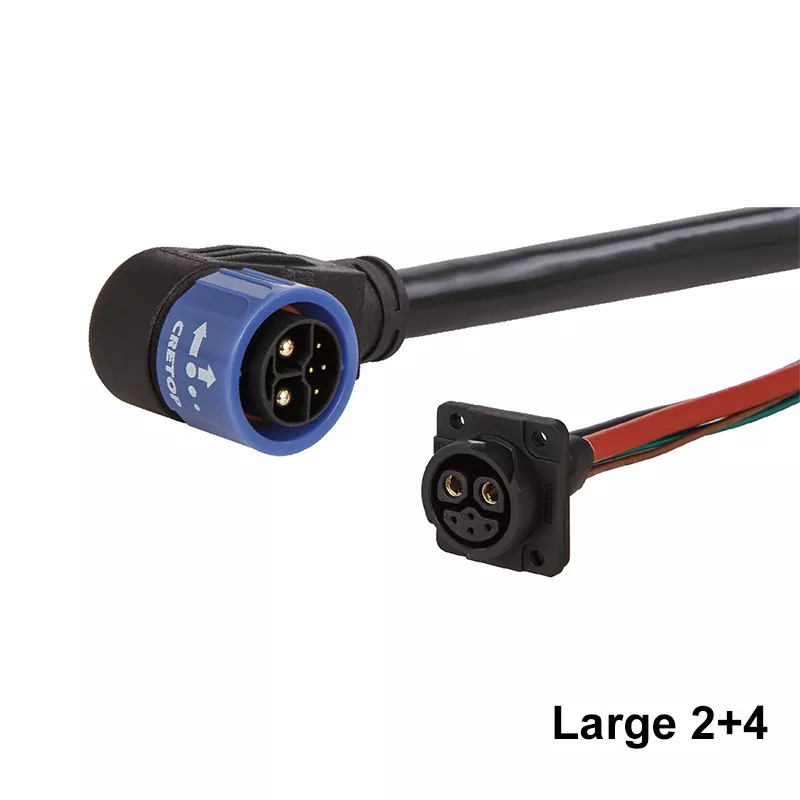Why Are Electric Two-Wheeler Connectors Crucial for Performance and Safety?
2024-12-26
Electric two-wheelers are revolutionizing personal transportation, offering an eco-friendly and efficient way to travel. However, one often overlooked component plays a pivotal role in their success: the electric two-wheeler connector. But why are these connectors so essential for the performance and safety of electric two-wheelers? Let’s explore how they make these vehicles more reliable, efficient, and safe for everyday use.
1. What Is an Electric Two-Wheeler Connector?
An electric two-wheeler connector is a small yet powerful component that links various electrical systems in the vehicle. These connectors are responsible for carrying electrical power and signals between key parts like the battery, motor, controller, and charging system. They allow these components to work seamlessly together, ensuring the vehicle operates smoothly.
2. Why Are Connectors Vital for Electric Two-Wheeler Performance?
Electric two-wheelers rely heavily on their electrical components to function properly. Connectors ensure that power is delivered efficiently and reliably from the battery to the motor and other systems. High-quality connectors:
- Improve Power Delivery: Ensure smooth and consistent power flow, reducing the risk of interruptions or power losses.
- Enhance Efficiency: Optimize the connection between key components, leading to better overall vehicle performance and energy consumption.
- Enable Faster Charging: Some advanced connectors support higher currents, which allows for quicker charging times.
3. How Do Electric Two-Wheeler Connectors Contribute to Safety?
Safety is a top priority for any electric vehicle. Connectors play an essential role in preventing potential electrical hazards:
- Prevent Short Circuits: Well-designed connectors can help avoid electrical short circuits that might cause damage or fires.
- Durability: Quality connectors are built to withstand vibrations, high temperatures, and exposure to moisture, ensuring long-term safety even in tough environments.
- Signal Integrity: By maintaining stable signals between components, connectors help prevent malfunctions or errors in vehicle operations, reducing the risk of accidents.
4. What Types of Connectors Are Used in Electric Two-Wheelers?
Electric two-wheelers use a range of connectors, each designed for specific purposes:
- Power Connectors: Carry the high-voltage current from the battery to the motor and controller.
- Charging Connectors: Facilitate the safe transfer of electricity from the charging station to the battery.
- Signal Connectors: Carry data between the vehicle’s electronic systems, such as the motor controller and battery management system (BMS).
- Waterproof Connectors: Ensure the connectors remain reliable even in wet or outdoor conditions.
5. How Can You Choose the Right Connector for Your Electric Two-Wheeler?
Choosing the right connector for an electric two-wheeler is crucial for ensuring safety and performance. When selecting a connector, consider these factors:
- Current Capacity: The connector must be able to handle the power demands of the motor and battery.
- Size and Compatibility: Ensure the connector fits your two-wheeler's design and electrical system.
- Durability: Opt for connectors that are resistant to heat, moisture, and mechanical stress.
- Certifications: Look for connectors with industry certifications like IP ratings for water resistance or UL listings for safety.
6. What Are the Challenges in Electric Two-Wheeler Connector Design?
Designing connectors for electric two-wheelers presents several challenges:
- Space Constraints: Two-wheelers have limited space for electrical systems, which means connectors must be compact but still capable of handling high power.
- Environmental Resistance: Connectors must be robust enough to withstand exposure to rain, dirt, and dust without losing functionality.
- Cost and Quality Balance: While connectors must be affordable, they also need to meet high-quality standards to ensure safety and reliability.
Final Thoughts
Electric two-wheeler connectors are a small but mighty component that plays a crucial role in the safety, performance, and efficiency of electric vehicles. As the demand for electric transportation grows, so does the need for advanced connectors that can keep up with the evolving technology and consumer expectations.



